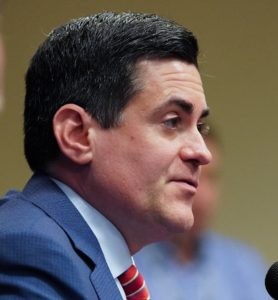Albert Mohler has a problem.
You may be tempted to think this problem was his surprising third-place finish in the race for Southern Baptist Convention president at last year’s annual meeting in Nashville. But that is only partially correct.
You may suggest that his problem is the lawsuit in which Southern Baptist Theological Seminary is named among a group of SBC entities and individuals for allegedly mishandling abuse. Again, that would be somewhat right.

David Bumgardner
You could suggest that Mohler’s problem is his growing antagonistic posture toward pundits, thinkers and journalists, such as respected Baptist journalist Brian Kaylor, whom Mohler dubbed a “liberal nitwit,” or, more recently, conservative New York Times columnist David Brooks, of whom Mohler said in a scathing piece in his WORLD Opinions column, “Sir, you are no conservative.”
Perhaps you believe the problem is that Mohler has effectively tripled-down on his 2020 endorsement of Donald Trump — an endorsement for which he refused to apologize or, at the very least, walk back even in the aftermath of the Jan. 6, 2021, Capitol riot.
Or maybe you would posit that it is Mohler’s tone-deaf insistence on retaining the names of Southern Seminary’s slaveholding founders, going so far as to say of them, “Their theological orthodoxy and Baptist confessionalism are an invaluable inheritance, and we stand with them in theological conviction, period.”
But you also might cite the scandal that ensued from resurfaced comments to Larry King in 1998 that there were no loopholes to obeying the Bible’s commands on slavery, for which, to his credit, he later apologized and called “stupid.” Perhaps this is his problem?
All those answers and observations would be valid, sound, right and true. But you would still have only half the answer.
His problem is deeper, more profound and immeasurably more scandalous than any of these. His most fundamental problem aside from being a sinner in need of redemption — redemption I believe he has received and joyously celebrate with him as a Christian brother — cannot possibly be any of the aforementioned.
“Albert Mohler’s most profound problem is that many in his domain no longer wish to obey the 11th Commandment: Thou shalt not criticize Albert Mohler.”
Albert Mohler’s most profound problem is that many in his domain no longer wish to obey the 11th Commandment: Thou shalt not criticize Albert Mohler.
The 11th Commandment
This has been a longstanding unspoken rule in Southern Baptist life, existing for as long as Mohler has graced the nation’s largest Protestant denomination with his leadership at its flagship seminary.
It is also a commandment I have been personally beholden to by once being scolded and not-quite-but-almost intimidated by a denominational statesman: “You know, every time you criticize the man in Louisville, I hear about it.”
Oh, the pages I could fill for a memoir of my life that would detail every time a leader, pastor or anonymous Twitter account contacted my pastor, mentors or even academic administrators for the grave sin of breaking the 11th Commandment.
Mohler’s tacit hypocrisy
The great irony here, of course, is that this unspoken commandment of keeping criticism of like-minded leaders to yourself is one that Mohler has, inexplicably, refused to obey himself.

Al Mohler
Just this week in the Monday episode of The Briefing, Mohler gave scathing remarks not only about David Brooks and The New York Times, but also about the evangelical figures who were profiled in Brooks’ most recent piece about the state of evangelicalism.
Mohler derided Brooks for profiling “several people he declares to be reformers trying to save evangelicalism from itself.”
Mohler went on to say he believes it to be Brooks’ judgment “that evangelicals don’t deserve much of a future unless evangelicals followed the directives of these would-be self-appointed reformers.”
But The Briefing was not the only place where Mohler seethed against the Brooks piece. In his World Opinions column that was published the same day, he used nearly identical language to convey his distaste in a summation of the article in question: “The article is a wide-ranging review that portrays certain figures as would-be reformers of evangelical Christianity in America.”
Interestingly, Mohler observed, “Each of these individuals is given voice in the essay, and they willingly posed for photographs that accompanied the story.”
Some of those “would-be self-appointed reformers” featured in the Brooks’ piece were from the SBC fold, such as Mohler’s former colleague Russell Moore, the former president of the SBC’s Ethics and Religious Liberty Commission. Yet another was Karen Swallow Prior, research professor of English and Christianity and culture at Southeastern Baptist Theological Seminary.
Too close for comfort?
When I first read these comments and made the connection, I immediately took to Twitter to point out this not-so-subtle and close-to-home criticism. Thabiti Anyabwile, pastor of Anacostia River Church in Washington, D.C., was the first to reply, noting he did not listen to The Briefing and no longer considered himself part of the evangelical movement.
Kristin Kobes Du Mez, author of the popular book Jesus and John Wayne, replied next to state that she disagreed with the framing of the Brooks piece.
Karen Swallow Prior, however, after quipping, “Framers gonna frame” in agreement with Du Mez, was confronted with Mohler’s remarks in the WORLD op-ed: “Evangelicals must recognize that we are facing a demand to abandon evangelicalism.”
Prior wasted no time in replying matter-of-factly, “I’m not abandoning anything.”
Conspicuously absent from my thread, which was seen on Twitter about 30,000 times, was Russell Moore.
The times they are a-changin’
In preparation for whatever this piece might have become (I had thought about working it into an analysis or news story), I made more than three dozen phone calls to individuals I believed, within reason, would have had an interest in commenting on the shocking development of Mohler subtly, albeit publicly, criticizing those in his own fold.
I reached out to individuals profiled in the Brooks piece. I reached out to Conservative Baptist Network Steering Council members who had accused Mohler of being a closeted liberal and/or covering for Critical Race Theorists. I reached out to more moderate SBC figures. I reached out to pastors, professors and pundits.
“Every single one of them either declined to give an interview on the record or did not get back with me in time for the publication deadline.”
For reasons that are now perfectly clear to me (Remember the 11th Commandment?), every single one of them either declined to give an interview on the record or did not get back with me in time for the publication deadline. However, a few agreed to comment on the condition of me withholding their identity.
In the few interviews I was able to conduct, I noticed a recurring theme: These individuals seemed to believe Mohler talks out of both sides of his mouth. This tendency, they believe, has alienated Southern Baptists both to the left of him, and, most crucially, to the right of him.
One thing remains unmistakably clear: Mohler is no longer immune to criticism — not from entity employees, not from pastors, certainly not from me, and, most crucially, certainly not from the SBC’s annual meeting electorate.
If Mohler persists in breaking his own rule to try to whip up and pander to a base that no longer trusts him, effectively biting the hand that has fed him, his colleagues will not hesitate even for a second to snap back.
Denominational leaders will begin to realize that if he is willing to turn on people many would consider to be his friends, then he will not hesitate to turn on them.
Setting the agenda

Russell Moore
In the piece that was effectively the genesis of this brouhaha, Russell Moore offered up comments that drew my attention. Commenting on David Brooks’ observation that while 80% of evangelicals voted for Trump in 2020, only a small minority end up causing political strife in the church, Moore opined: “The healthiest people spiritually tend to be the least engaged in these struggles. The unhealthiest tend to be the most engaged in spiritual life and politics. It doesn’t matter what the numbers are. The people who care the most are going to set the agenda.”
It would certainly be a stretch to read into Moore’s words a covert criticism of Mohler, and that is not at all what I am implying is going on here. And yet, the irony is not lost on me.
Mohler has devoted his entire career of denominational service to engaging in both politics and the spiritual life, while ignoring the existential threat they pose to each other.
By seeking to meld the two, he has become a living, breathing contradiction.
Perhaps this explains why the Southern Baptists I talked to believe he is duplicitous. And perhaps, therefore, it appears that his personal political ambitions — a crusade to what appears to me to be a thought in his mind of singlehandedly saving the SBC — has now trumped his previously unquestioned fealty to his colleagues and allies.
Perhaps the wedding of devotion to the GOP and devotion to Jesus is why the SBC is, to stick with Moore’s analogy, spiritually unhealthy.
And, to go further with Moore’s words, if it is true that the people who care the most about politics will set the agenda, it appears Mohler needs only to wait for a quorum to show up before calling for a vote.
But if he is not careful, he very well may find himself replaced by the very people he trashed to get his way, wanting no criticism even as he dished it out in the name of “evangelicalism,” thereby transgressing the commandment he expects everyone to abide by, but refuses to obey himself.
David Bumgardner currently serves as a Clemons Fellow with BNG. He is a senior at Texas Baptist College, the undergraduate arm of Southwestern Baptist Theological Seminary and is a member at Cornerstone Baptist Church in Arlington, Texas. Follow him on Twitter @david_bumg.
Related articles:
The moral hypocrisy of Albert Mohler (and evangelicals of his ilk) | Opinion by Marv Knox
Al Mohler’s curious defense of conversion therapy | Analysis by Alan Bean
Dear Al Mohler, you humiliate yourself. Repent. | Opinion by Alan Rudnick
World magazine editor quits as Mohler takes lead on adding opinion content to a uniquely reporting-centric publication| Analysis by Mark Wingfield


